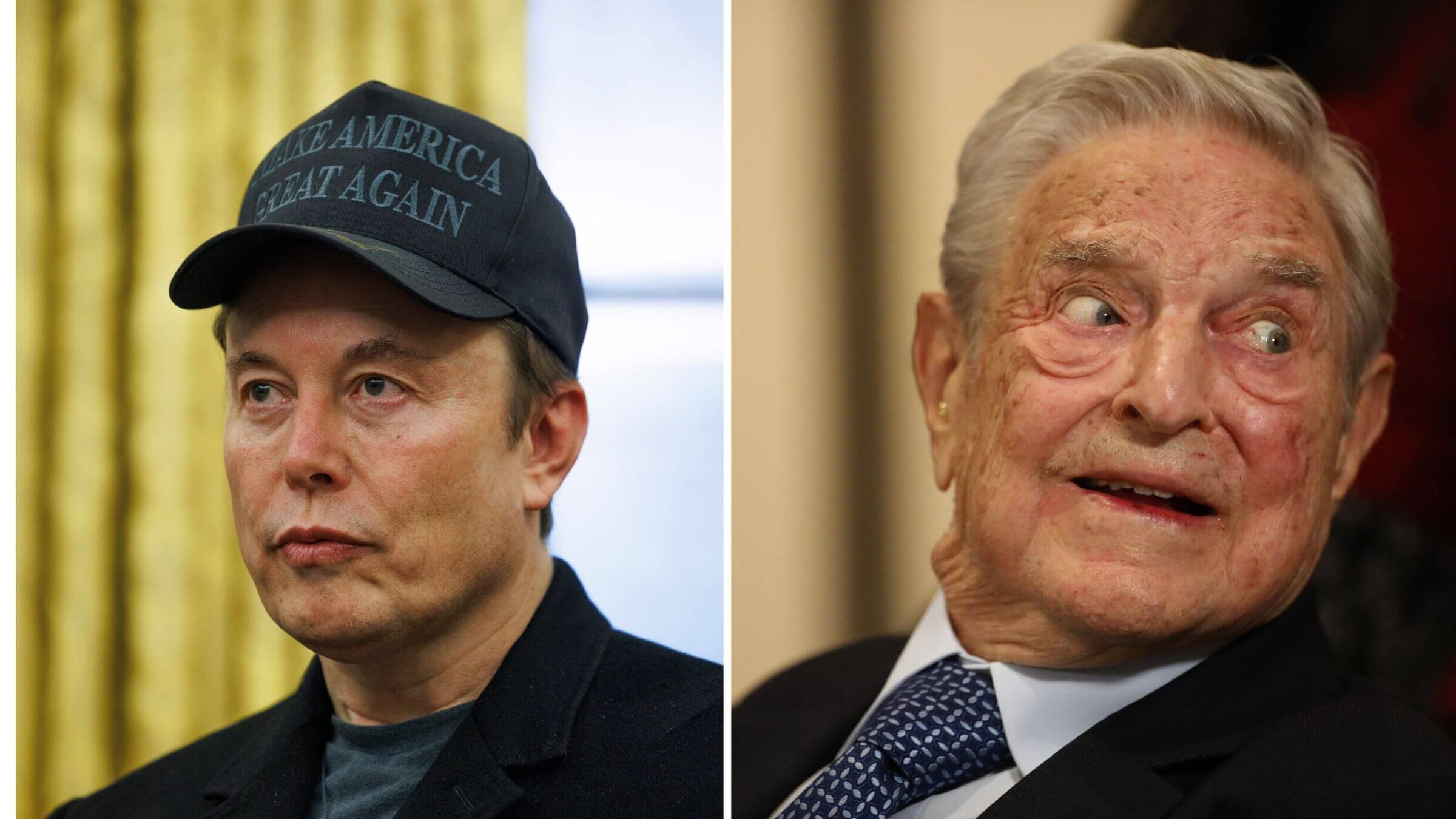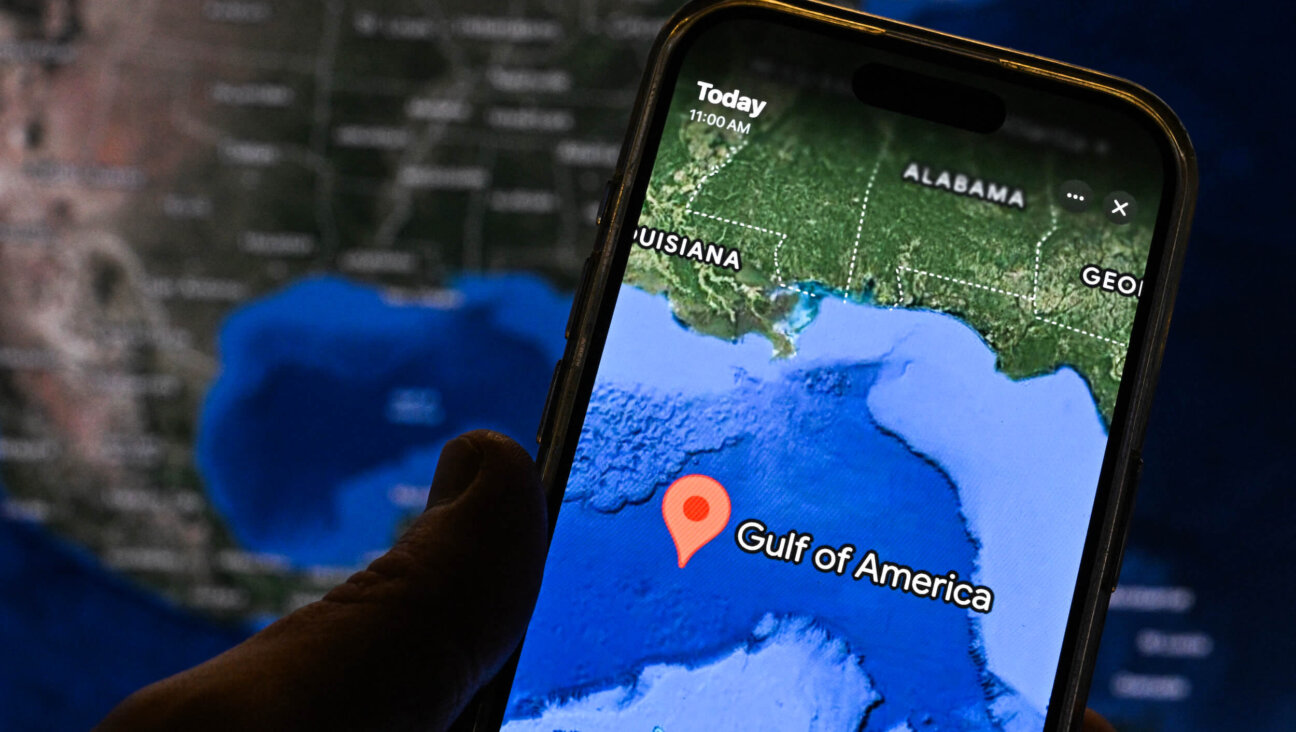Elon Musk is doing everything conspiracy theorists accuse George Soros of
Yet Musk’s efforts to influence the realms of politics and media remain unchallenged by the far-right

Elon Musk (left) and George Soros. Photo by Aaron Schwartz/CNP/Bloomberg and Simon Dawson/Bloomberg via Getty Images
Elon Musk is an unfathomably wealthy billionaire who has used his financial resources to gain influence over politics, media, and government institutions.
If that sounds familiar, it’s because right-wing populists have spent years hurling accusations of the same behavior at the liberal Jewish philanthropist George Soros.
Influential conspiracy theorists across the globe portray Soros as a shadowy puppet master manipulating global politics and controlling media narratives to serve his own self interest. Fueled by antisemitic conspiracy myths, these accusations have portrayed Soros — and, more recently, his son Alex, the new head of the family’s philanthropic foundation — as the ultimate villain in the far-right imagination, blamed for fomenting civil unrest and organizing election interference.
Now, Musk, who has allied himself with the global far-right and who donated more than $250 million to President Donald Trump’s reelection campaign, is doing what Soros has been accused of. His strategic sway over a powerful media platform, efforts to gain global political influence, and engagement with authoritarian figures mirror the very actions conspiracy theories attribute to Soros.
Yet despite this, the right lauds Musk as a visionary, while continuing to vilify Soros. The contrasting treatment of Musk and Soros reveals a fundamental truth of today’s iteration of right-wing populism: The problem was never billionaire influence itself — it was about ensuring that only a right-wing elite holds power.
On the right, a double standard
Unlike Soros, who influences industries and governments primarily by moving money — for instance, by short-selling currencies and funding political and social causes through philanthropy — Musk runs companies that are major players in industries vital to national security, media, and technology. His companies SpaceX and Tesla received at least $15.4 billion in government contracts in the past 10 years. And even before he began to engage more directly in politics, starting with his involvement in Trump’s campaign, his leadership of those companies, and the social media site X, granted him extraordinary leverage in the public square.
The SpaceX satellite internet network Starlink has become a critical tool in military operations, with Musk personally making decisions about its access in active war zones, such as Ukraine, thereby influencing the course of conflict.
Since acquiring X, formerly Twitter, in 2022, Musk has suspended journalists who reported on him, prompting accusations of silencing dissent; done away with independent fact-checking mechanisms; reinstated banned far-right accounts; amplified extremist rhetoric; and made changes to the network’s algorithms that led to the boosting of far-right conspiracy theories.
Soros has long faced accusations of covert media manipulation. But the extent of his engagement with the press is almost entirely philanthropic: His foundation funds media initiatives promoting journalistic independence in weaker democracies, like the Peruvian journalist collective IDL-Reporteros, which investigates government corruption.
The double standard is stark. While many on the right have vilified Soros as having too much influence over media, they have excused Musk’s direct control over a powerful global media platform as a commitment to “free speech.”
Vivek Ramaswamy, who is expected to soon launch a campaign for Ohio’s governorship, said that Musk’s actions “protected free speech,” but also pushed the antisemitic trope that Soros was manipulating Democratic vice presidential candidate Tim Walz from behind the scenes. Charlie Kirk, a conservative activist, went further, alleging that Soros seeks to “destroy speech,” while declaring that “Elon Musk liberating Twitter will go down as one of the greatest free speech victories in the history of Western civilization.”
Direct involvement in the U.S. government — and beyond
In the weeks since Trump’s inauguration, Musk has rapidly come to wield direct and extensive governmental power through his new Department of Government Efficiency. His reach has become so broad that in late January, after Musk announced that Trump had agreed to shut down USAID, Democratic Rep. Jamie Raskin issued the wry reminder that “we don’t have a fourth branch of government called Elon Musk.”
Musk now operates at the highest levels of political decision-making, with an unprecedented level of governmental access, marking a dangerous shift. Consumer advocates and Democratic lawmakers have raised concerns about his access to Social Security payment systems through DOGE, and about his unchecked influence over federal programs. Even Republicans, per a new Economist/YouGov survey, are losing enthusiasm for his involvement.
Yet globally, Musk’s reception has been markedly different from that of Soros — with meaningful consequences at home.
Soros has been attacked by authoritarian leaders like Viktor Orbán, Vladimir Putin and Recep Tayyip Erdoğan because his philanthropy supports democratic institutions and human rights in their respective countries: Hungary, Russia and Turkey. Musk, in turn, has received praise from these same authoritarian figures — and others.
Orbán praised the billionaire’s efforts to cut off funding for “globalist” organizations. Salvadoran President Nayib Bukele, known for his authoritarian crackdown on his opponents, lauded Musk for undermining USAID. Musk has embraced these endorsements, even reposting some of these statements on X.
Most significantly, Putin hailed Musk as an “outstanding person,” after an October report by The Wall Street Journal found that Musk has had multiple private conversations with the Russian leader over the past two years, and has adjusted his satellite communications policies in response to geopolitical pressures from Russia and China.
That relationship with the leader of a country that has frequently antagonized the U.S. has not prevented Musk from gaining extraordinary influence in the U.S. government.
Yet Soros’ supposed meddling in foreign politics has fueled countless right-wing attacks. For instance, former Fox News commentator Joseph diGenova suggested, without evidence, that George Soros “controls a very large part of the career foreign service of the United States State Department” and “the activities of FBI agents overseas.” In 2018, a conservative watchdog accused Soros of advancing a “far-left agenda abroad,” affecting the governments of Romania, Colombia, Macedonia and Albania.
Musk has now begun to openly support far-right parties with authoritarian tendencies in democratic elections outside the U.S., including the Reform Party in the United Kingdom and Germany’s Alternative for Germany (AfD), which Germany’s own Federal Office for the Protection of the Constitution labels a “suspected extremist” organization.
In a recent speech at an AfD rally, Musk urged the country to move beyond its “past guilt,” a reference to Nazism and the Holocaust. Moving beyond past guilt has been a talking point of far-right extremists, including neo-Nazis, for decades in Germany, and a strategy to diminish the significance assigned to the genocide of the Jews.
A right-wing shift
Musk’s new political profile represents the evolution of right-wing populism from anti-establishment rhetoric to a full embrace of tech-driven oligarchy, in which billionaires don’t just fund politics, but run it.
Musk’s rise proves that right-wing populists were never opposed to elite control, as they have professed throughout their long crusade against Soros. They simply wanted a billionaire in charge who aligned with their own ideological goals.
Musk’s ability to shape global politics in real time marks a dangerous turning point, suggesting that authoritarian-friendly figures will soon be not just tolerated but actively cultivated — so long as they’re on the right.
Musk, of course, is not a shadowy puppet master operating behind the scenes, the role in which conspiracy theories traditionally cast Soros. He is proudly making all these moves out in the open. He doesn’t just fund causes; he openly controls information ecosystems and directly enables right-wing authoritarian movements.
This is the real threat to democracy: the consolidation of media, political, and economic power in the hands of those who seek to dismantle democratic norms. And Musk, far more than Soros, embodies that reality.
A message from our Publisher & CEO Rachel Fishman Feddersen

I hope you appreciated this article. Before you go, I’d like to ask you to please support the Forward’s award-winning, nonprofit journalism so that we can be prepared for whatever news 2025 brings.
At a time when other newsrooms are closing or cutting back, the Forward has removed its paywall and invested additional resources to report on the ground from Israel and around the U.S. on the impact of the war, rising antisemitism and polarized discourse.
Readers like you make it all possible. Support our work by becoming a Forward Member and connect with our journalism and your community.
— Rachel Fishman Feddersen, Publisher and CEO




























